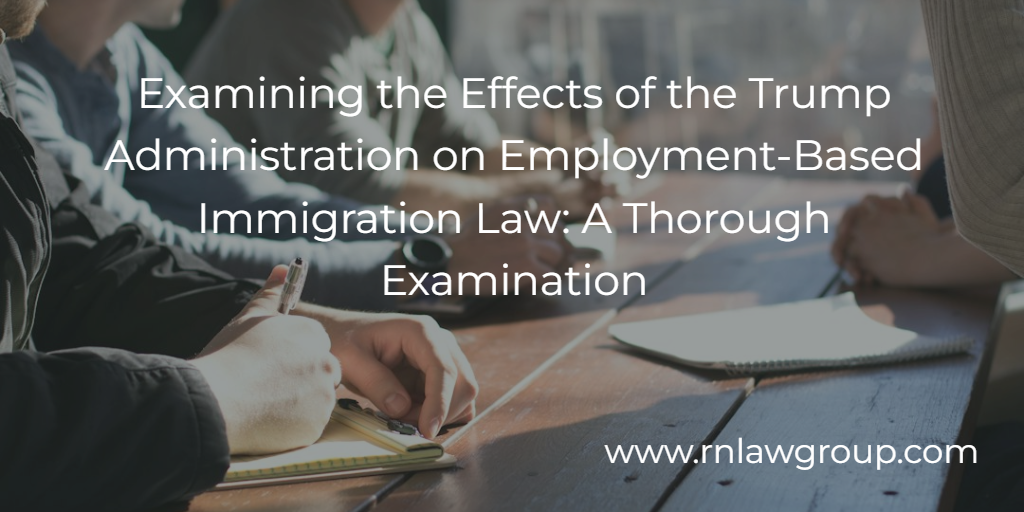
Examining the Effects of the Trump Administration on Employment-Based Immigration Law: A Thorough Examination
Overview
The US immigration system underwent substantial modifications from 2017 to 2021 while the Trump Administration was in office, especially with regard to employment-based immigration. The administration implemented a number of policy changes and regulatory improvements with the goal of giving priority to American workers and modernizing the immigration system in order to draw in highly trained individuals. This article offers a thorough examination of the reasons behind, ramifications, debates, and long-term impacts of the Trump Administration’s modifications to employment-based immigration legislation.
- H-1B Visa Program Restrictions
During the Trump Administration, significant changes were made to the H-1B visa program, which permits American firms to hire foreign nationals temporarily for specialized jobs:
- Tightening Regulations: The government put policies into place to make rules more stringent and to give H-1B visa applicants more attention. This included stricter specifications for proving that hiring foreign workers was essential and guaranteeing that they have specialized skills that were hard to come by in the home labor market.
- Wage Level Increases: The administration changed the wage requirements for the H-1B visa program, mandating that employers give foreign workers greater prevailing wages. Preventing firms from undercutting American wages and encouraging the use of domestic labor were the main objectives.
- Suspension of Premium Processing: Employers looking to hire foreign workers experienced processing delays as a result of the administration’s intermittent suspension of the premium processing of H-1B visa applications. This action was taken to allay worries about the H-1B visa program’s integrity and stop abuse.
- Diversity Visa Lottery Suspended
Under the Trump Administration, the Diversity Visa Lottery program, also referred to as the Green Card Lottery, was the subject of examination and efforts at suspension:
- Security Concerns: The government expressed worries about the Diversity Visa Lottery program’s potential for security breaches, claiming that it would give people from nations with ties to terrorism a way into the country.
- Legislative Efforts: Despite executive action, the Trump Administration was unable to halt the Diversity Visa Lottery program due to legal and legislative obstacles. The program was still in place, but there were more people calling for reform and more scrutiny.
- Plan for Merit-Based Immigration
Merit-based immigration was one of the main changes proposed by the Trump Administration for the immigration system:
- Points-Based System: The administration suggested switching to an immigration system that would prioritize applications according to a number of criteria, including age, English proficiency, work history, education, and skills. The goal of this program was to draw in highly qualified immigrants who could boost the American economy and address urgent labor shortages.
- Legislative Proposals: Congress failed to move legislation to implement comprehensive immigration reform, despite the administration outlining general guidelines for a merit-based immigration system. Democrats and a few Republicans who supported different strategies for immigration reform opposed the plans.
- Effects on Employers and Foreign Workers
The modifications made to employment-based immigration legislation by the Trump Administration have important ramifications for both employers and foreign employees.
- Uncertainty and Delays: The application process for a visa for foreign workers was made more unpredictable and time-consuming by increasing regulatory requirements and heightened scrutiny. Employers had to navigate complicated immigration laws and make sure that changing needs were met.
- Labor Market Dynamics: There were conflicting results on labor market dynamics from the administration’s emphasis on safeguarding American workers and increasing prevailing pay levels. Prioritizing domestic recruiting helped some firms and industries while others found it difficult to fill competent positions.
- Innovation and Competitiveness: According to critics, stringent immigration laws may make it more difficult for American businesses to draw in top talent from around the globe, so impeding innovation and competitiveness. Particularly worried about how visa limits will affect their capacity to hire qualified personnel are tech companies.
- Legal Challenges and Advocacy Efforts: Through litigation, advocacy campaigns, and grassroots mobilization, a variety of stakeholders, including corporate organizations, immigrant advocacy groups, and legal experts, contested the administration’s immigration policy. Legal concerns centered on matters like executive authority, administrative rulemaking processes, and due process rights.
- Arguments and Rebuttals
The modifications to employment-based immigration rules made by the Trump Administration were not without controversy and criticism:
- Allegations of Discrimination: Opponents said that the government was enacting immigration laws that unfairly singled out particular immigrant populations, such as people from nations with a majority of Muslims and communities of color. Concerns over potential biases in the selection process were highlighted by the administration’s emphasis on merit-based immigration.
- Economic Concerns: A number of economists and decision-makers expressed concern that the United States economy may suffer from tight immigration laws, especially in industries that depend on foreign innovation and expertise. Limitations on the entry of highly trained immigrants may be detrimental to the nation’s economy, employment prospects, and competitiveness abroad.
- Humanitarian Concerns: Supporters of immigrant rights and refugee resettlement expressed worries about the administration’s immigration policies from a humanitarian standpoint, especially with relation to vulnerable groups, refugees, and asylum seekers. Critics said that the halt to refugee admissions and limitations on access to asylum undermined America’s humanitarian duties and moral leadership.
- History and Prospective Consequences
The following long-lasting legacy of the Trump Administration’s modifications to employment-based immigration legislation continues to influence immigration policy and discourse:
- Political Divides: Trump’s immigration program widened rifts in opinion polls as proponents praised initiatives to strengthen border security and give priority to American workers, while opponents denounced the measures as discriminatory and anti-immigrant. In American politics, immigration is still a divisive and difficult topic that influences policy discussions and election campaigns.
- Policy Reversals: By putting an emphasis on inclusivity, compassion, and change, the Biden Administration has hinted that it will be departing from the Trump-era immigration policies. While promoting a more comprehensive approach to immigration reform, executive actions and legislative proposals aim to reverse many of the policies implemented by the previous administration.
- Ongoing Challenges: Through judicial challenges, administrative reforms, and legislative initiatives, the effects of the Trump Administration’s modifications to employment-based immigration legislation will persist. In an effort to strike a balance between divergent interests and beliefs, stakeholders from a variety of sectors will struggle with the intricate and constantly changing dynamics of immigration policy.
- In summary
The Trump Administration’s modifications to the employment-based immigration statute were a substantial shift from earlier approaches, emphasizing border security, worker protection, and merit-based immigration. Although proponents applauded these initiatives, they also sparked debate, criticism, and legal issues. The legacy of the Trump Administration’s reforms will influence future discussions and choices as the country works through the difficulties of immigration policy, affecting the direction of the immigration system in the United States for years to become, doubly so as the chances of a second Trump Administration continue to improve.
By: Karim Jivani
Karim Jivani is an Associate Attorney at Reddy Neumann Brown PC who focuses on employment-based non-immigrant visas. Karim’s practice covers all phases of the EB-1A and EB-2 NIW visa process including filing petitions, responding to Requests for Evidence (RFE), and drafting motions and appeals. Karim has also worked on all aspects of H-1B, L-1, I-140, and VAWA petitions.

